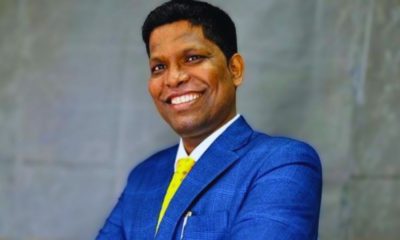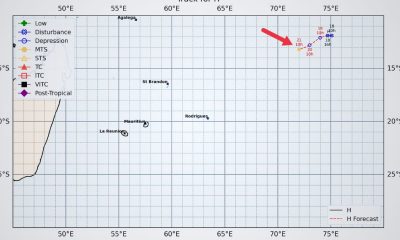Opinion
De l’Estrac: “Modi’s Visit, Crucial for Assuring the Agaléga Agreement Stability”

Indian PM Narendra Modi’s trip to Mauritius as the honoured guest for the National Day celebrations is far from coincidental; it embodied a meticulous diplomatic strategy. Former Mauritian Foreign Minister Jean Claude de l’Estrac asserted that this visit primarily aimed to reassure India about the continuance of bilateral agreements, particularly one related to Agaléga, which is vital to India’s maritime strategy. This insightful interview with de l’Estrac is unveiling the significant ramifications of Modi’s visit, intertwined with strategic partnerships, political calculations, and economic dependencies.
As a former head of Mauritian diplomacy, how do you interpret Prime Minister Narendra Modi’s choice as the first guest of honour for the new government’s National Day celebrations?
It is a timely decision, particularly as Prime Minister Modi is looking forward to rejuvenate relations with the new administration following the Jugnauth era.
His visit focused on confirming that the agreement concerning Agaléga will not be jeopardised by the transition in government.
While Agaléga isn’t Diego Garcia, the existing military infrastructure there has significantly boosted India’s maritime surveillance capabilities in the southwestern Indian Ocean—an initiative that also benefits Mauritius.
When in opposition, the Alliance du Changement raised alarms about India’s “hidden interests” in Agaléga. Now in power, do you think they will address this topic with the Indian Prime Minister?
There’s no real “issue” between India and Mauritius concerning this matter.
India has been transparent about its interests. Conversely, there is a local matter to consider.
The previous government claimed that the new infrastructure in Agaléga does not convert the island into an Indian base, which is a misleading assertion that the Alliance du Changement challenged when they were in opposition.
Even within India, leaders have made it clear that Agaléga serves a crucial strategic and logistical role for the Indian military in maritime surveillance.
This surveillance benefits India as much as it does Mauritius.
We still lack the capacity to effectively monitor our territorial waters, especially in light of the anticipated expansion of our maritime territory with the return of the Chagos Archipelago.
Modi’s visit may provide an opportunity for clarification and justification.
In diplomacy, it is not uncommon for smaller nations to seek the protective support of a military power.
Mauritius occupies a strategic position in the Indian Ocean. Is India intent on strengthening its military or commercial influence on the island, especially given its competition with China?
India’s concerns extend beyond Mauritius; it is particularly wary of Chinese military activity in the Indian Ocean.
Indian strategists share the American perspective that significant conflicts of the 21st century will unfold in this region. India is convinced that China’s Belt and Road Initiative, which has seen the Chinese establish a presence in various ports across the Indian Ocean, is a strategy to encircle India militarily—a claim that Beijing denies.
To counter this perceived “threat,” India is pursuing a dual strategy: bolstering strategic partnerships with the United States in the region while establishing its own bases, with Agaléga being a focal point.
They remain highly vigilant; just a few years ago, they successfully persuaded Mauritius to abandon a Chinese fishing port project at Pointe-aux-Sables.
Pravind Jugnauth has frequently emphasised his personal relationship with Narendra Modi, leveraging it for financial support and projects like the Metro Express. Does this invitation serve as a means for the new government to reassert itself and dispel the perception of an exclusive closeness between Jugnauth and Modi? Are they attempting to carve out their own position in New Delhi?
Mauritius-India relations do not rely on the occupants of the Government House in Mauritius or even those at the Rashtrapati Bhavan.
Successive Mauritian governments have maintained warm ties with Delhi for cultural reasons linked to our historical settlement.
Today, new dynamics have solidified these relationships on economic and geopolitical fronts, irrespective of political affiliations in Port-Louis and Delhi.
Modi’s SAGAR Programme
Is this a purely diplomatic gesture or a strategy aimed at reassuring certain segments of the electorate, particularly Hindu voters?
There is undoubtedly a political calculation involved, especially in the Mauritian context, but it is not the primary driver for India.
Beyond its connections with what it sees as its diaspora, India is motivated by its ambition to be a regional power acting as a “security provider” for all countries in the region.
It was during a previous visit to Mauritius that Modi outlined the principles of SAGAR—Security and Growth for All in the Region.
Beyond the symbolism, how might this visit affect the political dynamics in Mauritius?
It will not alter those dynamics in any way!
Regarding the Chagos Archipelago, India has supported Mauritius’ position at the UN while remaining a strategic ally of the United States and the United Kingdom. How is India reconciling these two priorities?
India aims to champion international law while promoting its own interests as an emerging power in the Indian Ocean, which it views as its “backwater.”
To achieve this, it has strengthened ties with the United States, particularly in response to the rising presence of the Chinese navy in the Indian Ocean, which India considers an “intrusion.”
Washington has shown interest in empowering India to take on the role of regional gendarme.
For this reason, the United States has invested significantly in bolstering India’s military capabilities.
A recent instance of this is the purchase of American-made Boeing P-81 aircraft, which have been adapted for use in Agaléga—these planes are designed for maritime surveillance and anti-submarine warfare.
France, which has a base on Réunion Island, is also a participant in this alliance.
Do you believe Modi’s presence could influence Mauritius’ diplomatic stance?
It’s not merely Modi’s presence that drives change. Over the years, and across all governments, Mauritian diplomacy has closely followed Indian analyses.
This influence is evident in our positions at the UN and our stance towards China.
Typically, high-level state visits culminate in the signing of agreements. What types of agreements or economic commitments might arise from this visit?
We have a glimpse of the agreements likely to be signed, thanks to a press conference held by the Indian Ministry of External Affairs, which exhibits greater transparency than we do.
Several Memoranda of Understanding (MoU) will be executed across a broad spectrum of sectors, covering modern financial crime surveillance, a new accord between the Indian Navy and the police force, training for 500 civil servants through a partnership with the Ministry of Civil Service, and support for small and medium enterprises.
Is there a risk that Mauritius could become overly reliant on India for investment and financial support?
I don’t think so. Despite the depth of our relationship with India, Mauritius has always cultivated strong ties with various other nations.
For a significant period, we took pride in our non-alignment.
However, with the presence of two military bases from the same alliance on our territory, I’m uncertain if we can maintain that claim.
What message does this visit convey about Mauritius’ geopolitical stance in the Indian Ocean?
Historically, Mauritius has firmly aligned itself with the Western camp, a position that is now even stronger given India’s strategic partnership with the United States.
Former President Biden regarded the partnership with India as the “partnership of the century.”
The dispute between India and Mauritius concerning investment taxation, which led to a renegotiation of the tax treaty, is still fresh in memory. Do you think this issue might resurface during Modi’s visit?
I doubt that contentious topics will be on the agenda…
Finally, as a former Foreign Minister, do you consider this invitation as emblematic of a coherent and strategic diplomatic vision, or is it primarily a political manoeuvre?
This visit is entirely consistent with Mauritian diplomacy, which has evolved over many decades.
Modi’s India, like that of his predecessors, has always shown considerable regard for maintaining high-quality relations with Mauritius.
After this visit, can we anticipate a strengthening of relations between Mauritius and India, perhaps leading to greater economic and political integration?
We may witness more consolidation than sheer intensification. The relationship between the two nations is already robust.
However, there might be prospects for increased economic collaboration.
I feel that Mauritian businesses have yet to explore the full potential of the diverse opportunities available through our trade agreement—the first one India signed with an African nation.
This agreement encompasses a broad range of areas, including both goods and services.
It has been a considerable time since I saw a delegation of Mauritian businesspeople in Bombay, nor have I seen Indian investors scouting opportunities in Mauritius aimed at accessing the African market, particularly the advantages stemming from our COMESA membership. These represent lost opportunities for both sides.
In the long term, does this rapprochement with India enhance Mauritius’ diplomatic independence, or could it risk entrenching the country in an imbalanced relationship?
For a small country like Mauritius, it is not unwise to rely on a powerful and benevolent neighbour. Each side can indeed find mutual benefits.
Source: Defi Media











